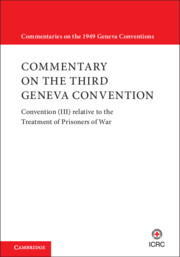 Commentary on the Third Geneva Convention
Commentary on the Third Geneva Convention from Section IV - Financial resources of prisoners of war
Published online by Cambridge University Press: 21 August 2021
The first sentence of Article 58(1) recognizes the right of the DetainingPower to determine the maximum amount of cash or of camp money – normallyissued for prisoners’ use inside the camp – that prisoners of war may havein their possession. The purpose of this provision is, on the one hand, toensure that prisoners of war have a reasonable amount of money at theirdisposal for daily purchases and, on the other hand, to limit that amount toavoid such money being used to facilitate escape or other abuses. TheDetaining Power has the unilateral right to determine the amount until anarrangement on the matter is reached with the Protecting Power, if any.
To save this book to your Kindle, first ensure no-reply@cambridge.org is added to your Approved Personal Document E-mail List under your Personal Document Settings on the Manage Your Content and Devices page of your Amazon account. Then enter the ‘name’ part of your Kindle email address below. Find out more about saving to your Kindle.
Note you can select to save to either the @free.kindle.com or @kindle.com variations. ‘@free.kindle.com’ emails are free but can only be saved to your device when it is connected to wi-fi. ‘@kindle.com’ emails can be delivered even when you are not connected to wi-fi, but note that service fees apply.
Find out more about the Kindle Personal Document Service.
To save content items to your account, please confirm that you agree to abide by our usage policies. If this is the first time you use this feature, you will be asked to authorise Cambridge Core to connect with your account. Find out more about saving content to Dropbox.
To save content items to your account, please confirm that you agree to abide by our usage policies. If this is the first time you use this feature, you will be asked to authorise Cambridge Core to connect with your account. Find out more about saving content to Google Drive.